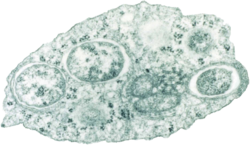「アルファプロテオバクテリア綱」の版間の差分
タグ: モバイル編集 モバイルウェブ編集 |
m cewbot: ウィキ文法修正 2: <br/>タグの違反 |
||
| 51行目: | 51行目: | ||
***[[Sphingomonadaceae]] |
***[[Sphingomonadaceae]] |
||
**[[Kiloniellales]] |
**[[Kiloniellales]] |
||
*** ''[[Kiloniella]]属''、''[[Kopriimonas]]''属、''[[Rhodovibrio]]属''および ''[[Pelagibius]]''<ref name="Ferla" />''属''< |
*** ''[[Kiloniella]]属''、''[[Kopriimonas]]''属、''[[Rhodovibrio]]属''および ''[[Pelagibius]]''<ref name="Ferla" />''属''<br /> |
||
** [[Kordiimonadales]] |
** [[Kordiimonadales]] |
||
*** ''[[Kordiimonas]]属''と''[[Rhodothalassium]]''<ref name="Ferla" />''属''}} |
*** ''[[Kordiimonas]]属''と''[[Rhodothalassium]]''<ref name="Ferla" />''属''}} |
||
'''アルファプロテオバクテリア綱'''(Alphaproteobacteria)とは[[真性細菌]]の[[プロテオバクテリア門]]の[[綱 (分類学)|綱]]の一つ<ref name="Bergey2C">{{cite book|editor=George M. Garrity|title=The Proteobacteria|url=https://www.springer.com/life+sciences/book/978-0-387-24145-6|edition=2nd|series=Bergey's Manual of Systematic Bacteriology|date=July 26, 2005|publisher=Springer|isbn=978-0-387-24145-6|pages=1388|volume=2C|location=New York|last1=Brenner|last2=Krieg|last3=Staley|first1=Don J.|first2=Noel R.|first3=James T.|origyear=1984(Williams & Wilkins)|id=British Library no. GBA561951}}</ref> 。綱内の細菌はすべて同じ祖先から派生したが、非常に多様で、共通の性質が殆どない場合が多い。[[グラム陰性]]であるが、細胞内寄生種は[[プロテオグリカン]]を持たず、したがって[[グラム染色]]試験での結果は陽性になることもある。<ref name="Euzeby">{{cite web|url=http://www.bacterio.cict.fr/classifphyla.html#Proteobacteria|title=Alphaproteobacteria|accessdate=2011-11-17|author=J.P. Euzéby|publisher=[[List of Prokaryotic names with Standing in Nomenclature]] (LPSN)|archiveurl=https://web.archive.org/web/20130127030659/http://www.bacterio.cict.fr/classifphyla.html|archivedate=2013-01-27|deadurl=yes}}</ref> |
'''アルファプロテオバクテリア綱'''(Alphaproteobacteria)とは[[真性細菌]]の[[プロテオバクテリア門]]の[[綱 (分類学)|綱]]の一つ<ref name="Bergey2C">{{cite book|editor=George M. Garrity|title=The Proteobacteria|url=https://www.springer.com/life+sciences/book/978-0-387-24145-6|edition=2nd|series=Bergey's Manual of Systematic Bacteriology|date=July 26, 2005|publisher=Springer|isbn=978-0-387-24145-6|pages=1388|volume=2C|location=New York|last1=Brenner|last2=Krieg|last3=Staley|first1=Don J.|first2=Noel R.|first3=James T.|origyear=1984(Williams & Wilkins)|id=British Library no. GBA561951}}</ref> 。綱内の細菌はすべて同じ祖先から派生したが、非常に多様で、共通の性質が殆どない場合が多い。[[グラム陰性]]であるが、細胞内寄生種は[[プロテオグリカン]]を持たず、したがって[[グラム染色]]試験での結果は陽性になることもある。<ref name="Euzeby">{{cite web|url=http://www.bacterio.cict.fr/classifphyla.html#Proteobacteria|title=Alphaproteobacteria|accessdate=2011-11-17|author=J.P. Euzéby|publisher=[[List of Prokaryotic names with Standing in Nomenclature]] (LPSN)|archiveurl=https://web.archive.org/web/20130127030659/http://www.bacterio.cict.fr/classifphyla.html|archivedate=2013-01-27|deadurl=yes}}</ref> |
||
2017年9月29日 (金) 00:18時点における版
| アルファプロテオバクテリア綱 | |||||||||
|---|---|---|---|---|---|---|---|---|---|
 昆虫細胞内のボルバキア属(Wolbachia)の透過電子顕微鏡写真。
出典:Public Library of Science / Scott O'Neill | |||||||||
| 分類 | |||||||||
| |||||||||
| 亜綱 subclasses | |||||||||
|
アルファプロテオバクテリア綱(Alphaproteobacteria)とは真性細菌のプロテオバクテリア門の綱の一つ[3] 。綱内の細菌はすべて同じ祖先から派生したが、非常に多様で、共通の性質が殆どない場合が多い。グラム陰性であるが、細胞内寄生種はプロテオグリカンを持たず、したがってグラム染色試験での結果は陽性になることもある。[4]
性質
アルファプロテオバクテリア綱は非常に多様な生物群である。ある属は光栄養細菌であり、その一部はC1化合物を代謝する(例:Methylobacterium spp.)。またある属は植物共生細菌であり(例: Rhizobium spp.)、ある属は節足動物の内生菌であり(Wolbachia属)、ある属は細胞内侵襲性の感染菌である(例: Rickettsia属)。すでに絶滅したが、アルファプロテオバクテリア綱の細菌にはかつて真核生物の細胞に侵入して現在のミトコンドリアとなったプロトミトコンドリアがいた(細胞内共生説)[2] 。Rhizobium radiobacter (過去のAgrobacterium tumefaciens)は植物細胞に外来DNAを転移させるために用いられる[5] 。Pelagibacter ubiqueといった好気性の非酸素光栄養細菌はアルファプロテオバクテリア綱であり、外洋の微生物コミュニティの10%以上を構成すると考えられている海中プランクトンである。
系統発生とゲノム
Pelagibacter属、Pelagibacter ubiqueは他の属と遺伝子の数やGC含量が大きく異なり、系統図上の位置について議論がある 。Pelagibacterales属、Rickettsiales属およびHolosporales属のゲノムは特にATリッチである。ATリッチはまた人為的なクラスター化を可能にし、収束進化の結果である可能性がある[6][7][8] 。反論もある[9][10][11]。これに対し、これら属種についてリボソームRNAのGC含量が同定され、この議論が今後決着する可能性がある。リボソームRNAのGC含量は伝統的な系統学的特徴の標識であり、ゲノムのGC含量への反映が小さいためである。例えば、Holosporales属の種のゲノムのGC含量はPelagibacterales属とRickettsiales属のそれと同様に小さいが、リボソームRNAのGC含量は2属と比べて非常に高い。したがって、Holosporales属は後者の2属よりもゲノム高GC含量の種とより関連が深い。
アルファプロテオバクテリア綱には3つの亜綱(Magnetococcidae亜綱、Rickettsidae亜綱およびCaulobacteridae亜綱)がある。このうち、系統発生が古いのはMagnetococcidae亜綱であり、走磁性細菌のMagnetococcus marinusが属している[12] 。Rickettsidae亜綱は細胞内生息細菌のRickettsiales目と自由生活細菌のPelagibacterales目を有する。Caulobacteridae亜綱には9目が属している(Holosporales、Rhodospirillales、Sphingomonadales、 Rhodobacterales, Caulobacterales、Kiloniellales、Kordiimonadales、Parvularculales、Sneathiellales)。
アルファプロテオバクテリア綱の6つの目(Rhizobiales、Rhodobacterales、Rhodospirillales、Rickettsiales、SphingomonadalesおよびCaulobacterales)と7つの科(Rickettsiaceae、Anaplasmataceae、Rhodospirillaceae、Acetobacteraceae、Bradyrhiozobiaceae、BrucellaceaeおよびBartonellaceae)を区別する特徴の一つに、総タンパク質や、一般的に広く分布するタンパク質の保存インデルがある。インデルの比較・解析はアルファプロテオバクテリア綱の種の同定や新種の分類に役立つ [13] 。アルファプロテオバクテリア綱は、ベータプロテオバクテリア綱とガンマプロテオバクテリア綱を除く他の真性細菌の門と綱よりも遅く系統分岐した。[14][15]
系統発生図
アルファプロテオバクテリア綱の系統発生図は「原核生物の名前のリストと命名法の提案」(LPSN) と米国立生物工学情報センター(NCBI)[16] と、国際学術団体The All-Species Living Tree Project(LTP)が発行する「the phylogeny is based on 16S rRNA-based LTP release 106」から提供されている。 [17]
| |||||||||||||||||||||||||||||||||||||||||||||||||||||||||||||||||||||||||||||||||||||
- (*)
- Aquaspirillum polymorphum ♠ (Williams and Rittenberg 1957) Hylemon et al. 1973
- ?Furvibacter属 ♠ Lee et al. 2007
- ?Kopriimonas byunsanensis ♠ Kwon et al. 2005
- ?Magnetococcus marinus Bazylinski et al. 2012 (in press)
- ?Micavibrio aeruginosavorus ♠ Lambina et al. 1983
- ?Polymorphum gilvum ♠ Cai 2010
- ?Reyranella massiliensis Pagnier et al. 2011
- ?Ronia tepidophila ♠
- ?Subaequorebacter tamlense ♠ Lee 2006
- ?Tuberoidobacter mutans ♠
- ?Vibrio adaptatus Muir et al. 1990
- ?Vibrio cyclosites Muir et al. 1990
- Rhodovibrio属
♠ NCBIで登録されているがLSPNで表記されていない。
自然遺伝子形質転換
アルファプロテオバクテリア綱の自然遺伝子形質転換の過程についてはAgrobacterium tumefaciens[18] 、Methylobacterium organophilum[19] 、およびBradyrhizobium japonicum[20] で明らかになっている。形質転換はDNAをある細胞から別の細胞に移動させる過程であり、相同組換えによって供給DNAは受容ゲノムに組み込まれる。
脚注
- ^ “Streamlining and core genome conservation among highly divergent members of the SAR11 clade.”. MBio 3 (5): e00252-12. (2012). doi:10.1128/mBio.00252-12. PMC 3448164. PMID 22991429.
- ^ a b c d “New rRNA gene-based phylogenies of the Alphaproteobacteria provide perspective on major groups, mitochondrial ancestry and phylogenetic instability”. PLOS ONE 8 (12): e83383. (2013). doi:10.1371/journal.pone.0083383. PMC 3859672. PMID 24349502.
- ^ Brenner, Don J.; Krieg, Noel R.; Staley, James T. (July 26, 2005) [1984(Williams & Wilkins)]. George M. Garrity. ed. The Proteobacteria. Bergey's Manual of Systematic Bacteriology. 2C (2nd ed.). New York: Springer. pp. 1388. ISBN 978-0-387-24145-6. British Library no. GBA561951
- ^ J.P. Euzéby. “Alphaproteobacteria”. List of Prokaryotic names with Standing in Nomenclature (LPSN). 2013年1月27日時点のオリジナルよりアーカイブ。2011年11月17日閲覧。
- ^ “Stable incorporation of plasmid DNA into higher plant cells: the molecular basis of crown gall tumorigenesis”. Cell 11 (2): 263–71. (1977). doi:10.1016/0092-8674(77)90043-5. PMID 890735.
- ^ Rodríguez-Ezpeleta N, Embley TM (2012). “The SAR11 group of alpha-proteobacteria is not related to the origin of mitochondria.”. PLOS ONE 7 (1): e30520. doi:10.1371/journal.pone.0030520. PMC 3264578. PMID 22291975.
- ^ “Independent genome reduction and phylogenetic reclassification of the oceanic SAR11 clade.”. Mol Biol Evol 29 (2): 599–615. (Feb 2012). doi:10.1093/molbev/msr203. PMID 21900598.
- ^ “Comparative and phylogenomic evidence that the alphaproteobacterium HIMB59 is not a member of the oceanic SAR11 clade.”. PLOS ONE 8 (11): e78858. (2013). doi:10.1371/journal.pone.0078858. PMC 3815206. PMID 24223857.
- ^ “Phylogenomic analysis of Odyssella thessalonicensis fortifies the common origin of Rickettsiales, Pelagibacter ubique and Reclimonas americana mitochondrion.”. PLOS ONE 6 (9): e24857. (2011). doi:10.1371/journal.pone.0024857. PMC 3177885. PMID 21957463.
- ^ “Phylogenomic evidence for a common ancestor of mitochondria and the SAR11 clade.”. Sci Rep 1: 13. (2011). doi:10.1038/srep00013. PMC 3216501. PMID 22355532.
- ^ “A robust species tree for the alphaproteobacteria”. Journal of Bacteriology 189 (13): 4578–86. (July 2007). doi:10.1128/JB.00269-07. PMC 1913456. PMID 17483224.
- ^ Bazylinski DA, Williams TJ, Lefèvre CT, Berg RJ, Zhang CL, Bowser SS, Dean AJ, Beveridge TJ. (2012) Magnetococcus marinus gen. nov., sp. nov., a marine, magnetotactic bacterium that represents a novel lineage (Magnetococcaceae fam. nov.; Magnetococcales ord. nov.) at the base of the Alphaproteobacteria.
- ^ Gupta RS (2005). “Protein signatures distinctive of Alphaproteobacteria and its subgroups and a model for Alpha proteobacterial evolution”. Crit Rev Microbiol 31 (2): 135. doi:10.1080/10408410590922393. PMID 15986834.
- ^ Gupta R.S. (2000). “Phylogeny of Proteobacteria: Relationships to other eubacterial phyla and to eukaryotes”. FEMS Microbiol. Rev. 24 (4): 367–402. doi:10.1111/j.1574-6976.2000.tb00547.x. PMID 10978543.
- ^ Gupta R.S.; Sneath P.H.A. (2007). “Application of the Character compatibility approach to generalized molecular sequence data: Branching order of the Proteobacterial subdivisions”. J. Mol. Evol. 64 (1): 90–100. doi:10.1007/s00239-006-0082-2. PMID 17160641.
- ^ Sayers. “Alphaproteobacteria”. National Center for Biotechnology Information (NCBI) taxonomy database. 2011年6月5日閲覧。
- ^ 'The All-Species Living Tree' Project.“16S rRNA-based LTP release 106 (full tree)”. Silva Comprehensive Ribosomal RNA Database. 2011年11月17日閲覧。
- ^ “Natural transformation of Pseudomonas fluorescens and Agrobacterium tumefaciens in soil”. Appl. Environ. Microbiol. 67 (6): 2617–21. (2001). doi:10.1128/AEM.67.6.2617-2621.2001. PMC 92915. PMID 11375171.
- ^ “Genetic transformation in Methylobacterium organophilum”. J. Gen. Microbiol. 98 (1): 265–72. (1977). doi:10.1099/00221287-98-1-265. PMID 401866.
- ^ “Deoxyribonucleate binding and transformation in Rhizobium jpaonicum”. J. Bacteriol. 111 (2): 356–60. (1972). PMC 251290. PMID 4538250.
